Vodafone: The Effect of Globalisation and External Factors
VerifiedAdded on 2020/11/12
|11
|3071
|421
Essay
AI Summary
This essay analyzes the impact of globalization on Vodafone, a major player in the telecommunications industry. It explores how Vodafone has been affected by globalization, including its expansion into new markets and the adoption of new technologies. The essay examines external environmental factors such as social-cultural, technological, and political influences that impact Vodafone's operations and strategies. It discusses the benefits of globalization for Vodafone, such as improved products and services, affordable prices, and increased investment opportunities, while also addressing the challenges and threats posed by competition and evolving market dynamics. The analysis covers the company's adaptation to changing customer perceptions, technological advancements like 4G and the upcoming 5G network, and the influence of government policies and regulations. Overall, the essay provides a comprehensive overview of Vodafone's response to globalization and its position in the global telecommunications landscape.

ESSAY
Paraphrase This Document
Need a fresh take? Get an instant paraphrase of this document with our AI Paraphraser

Table of Contents
Effect of Globalisation on Vodafone .........................................................................................3
External environmental factors...................................................................................................5
REFERENCES................................................................................................................................9
Effect of Globalisation on Vodafone .........................................................................................3
External environmental factors...................................................................................................5
REFERENCES................................................................................................................................9
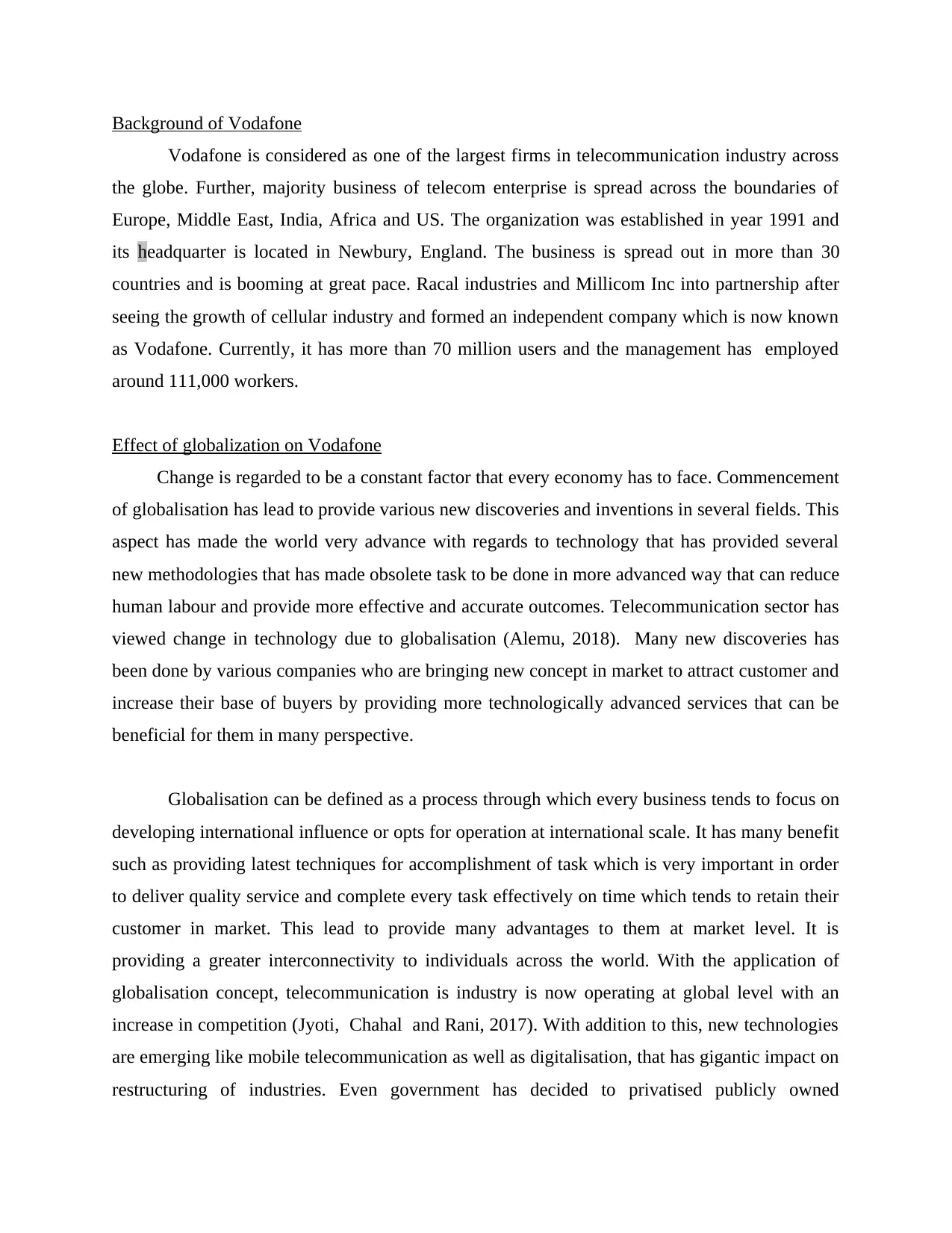
Background of Vodafone
Vodafone is considered as one of the largest firms in telecommunication industry across
the globe. Further, majority business of telecom enterprise is spread across the boundaries of
Europe, Middle East, India, Africa and US. The organization was established in year 1991 and
its headquarter is located in Newbury, England. The business is spread out in more than 30
countries and is booming at great pace. Racal industries and Millicom Inc into partnership after
seeing the growth of cellular industry and formed an independent company which is now known
as Vodafone. Currently, it has more than 70 million users and the management has employed
around 111,000 workers.
Effect of globalization on Vodafone
Change is regarded to be a constant factor that every economy has to face. Commencement
of globalisation has lead to provide various new discoveries and inventions in several fields. This
aspect has made the world very advance with regards to technology that has provided several
new methodologies that has made obsolete task to be done in more advanced way that can reduce
human labour and provide more effective and accurate outcomes. Telecommunication sector has
viewed change in technology due to globalisation (Alemu, 2018). Many new discoveries has
been done by various companies who are bringing new concept in market to attract customer and
increase their base of buyers by providing more technologically advanced services that can be
beneficial for them in many perspective.
Globalisation can be defined as a process through which every business tends to focus on
developing international influence or opts for operation at international scale. It has many benefit
such as providing latest techniques for accomplishment of task which is very important in order
to deliver quality service and complete every task effectively on time which tends to retain their
customer in market. This lead to provide many advantages to them at market level. It is
providing a greater interconnectivity to individuals across the world. With the application of
globalisation concept, telecommunication is industry is now operating at global level with an
increase in competition (Jyoti, Chahal and Rani, 2017). With addition to this, new technologies
are emerging like mobile telecommunication as well as digitalisation, that has gigantic impact on
restructuring of industries. Even government has decided to privatised publicly owned
Vodafone is considered as one of the largest firms in telecommunication industry across
the globe. Further, majority business of telecom enterprise is spread across the boundaries of
Europe, Middle East, India, Africa and US. The organization was established in year 1991 and
its headquarter is located in Newbury, England. The business is spread out in more than 30
countries and is booming at great pace. Racal industries and Millicom Inc into partnership after
seeing the growth of cellular industry and formed an independent company which is now known
as Vodafone. Currently, it has more than 70 million users and the management has employed
around 111,000 workers.
Effect of globalization on Vodafone
Change is regarded to be a constant factor that every economy has to face. Commencement
of globalisation has lead to provide various new discoveries and inventions in several fields. This
aspect has made the world very advance with regards to technology that has provided several
new methodologies that has made obsolete task to be done in more advanced way that can reduce
human labour and provide more effective and accurate outcomes. Telecommunication sector has
viewed change in technology due to globalisation (Alemu, 2018). Many new discoveries has
been done by various companies who are bringing new concept in market to attract customer and
increase their base of buyers by providing more technologically advanced services that can be
beneficial for them in many perspective.
Globalisation can be defined as a process through which every business tends to focus on
developing international influence or opts for operation at international scale. It has many benefit
such as providing latest techniques for accomplishment of task which is very important in order
to deliver quality service and complete every task effectively on time which tends to retain their
customer in market. This lead to provide many advantages to them at market level. It is
providing a greater interconnectivity to individuals across the world. With the application of
globalisation concept, telecommunication is industry is now operating at global level with an
increase in competition (Jyoti, Chahal and Rani, 2017). With addition to this, new technologies
are emerging like mobile telecommunication as well as digitalisation, that has gigantic impact on
restructuring of industries. Even government has decided to privatised publicly owned
⊘ This is a preview!⊘
Do you want full access?
Subscribe today to unlock all pages.

Trusted by 1+ million students worldwide
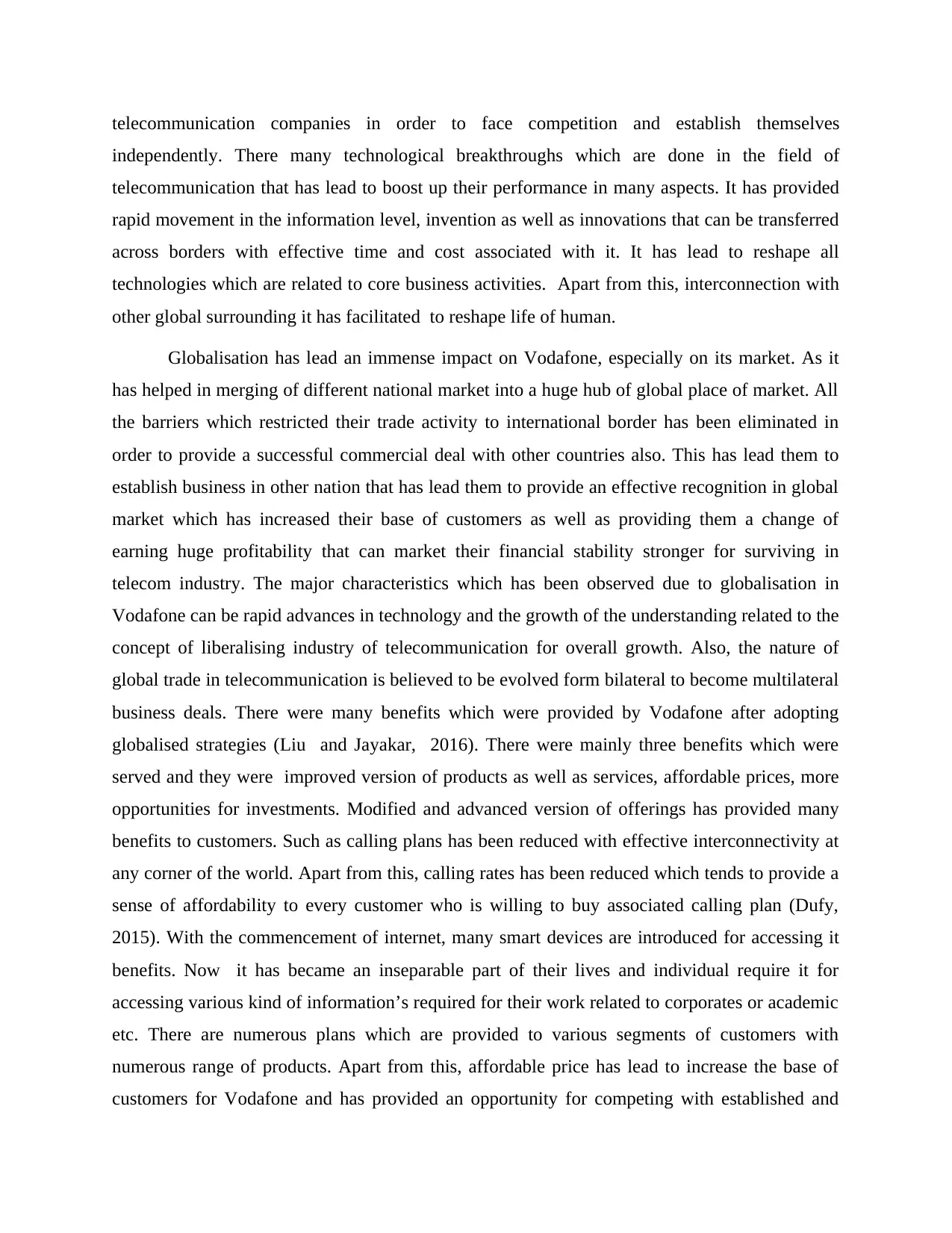
telecommunication companies in order to face competition and establish themselves
independently. There many technological breakthroughs which are done in the field of
telecommunication that has lead to boost up their performance in many aspects. It has provided
rapid movement in the information level, invention as well as innovations that can be transferred
across borders with effective time and cost associated with it. It has lead to reshape all
technologies which are related to core business activities. Apart from this, interconnection with
other global surrounding it has facilitated to reshape life of human.
Globalisation has lead an immense impact on Vodafone, especially on its market. As it
has helped in merging of different national market into a huge hub of global place of market. All
the barriers which restricted their trade activity to international border has been eliminated in
order to provide a successful commercial deal with other countries also. This has lead them to
establish business in other nation that has lead them to provide an effective recognition in global
market which has increased their base of customers as well as providing them a change of
earning huge profitability that can market their financial stability stronger for surviving in
telecom industry. The major characteristics which has been observed due to globalisation in
Vodafone can be rapid advances in technology and the growth of the understanding related to the
concept of liberalising industry of telecommunication for overall growth. Also, the nature of
global trade in telecommunication is believed to be evolved form bilateral to become multilateral
business deals. There were many benefits which were provided by Vodafone after adopting
globalised strategies (Liu and Jayakar, 2016). There were mainly three benefits which were
served and they were improved version of products as well as services, affordable prices, more
opportunities for investments. Modified and advanced version of offerings has provided many
benefits to customers. Such as calling plans has been reduced with effective interconnectivity at
any corner of the world. Apart from this, calling rates has been reduced which tends to provide a
sense of affordability to every customer who is willing to buy associated calling plan (Dufy,
2015). With the commencement of internet, many smart devices are introduced for accessing it
benefits. Now it has became an inseparable part of their lives and individual require it for
accessing various kind of information’s required for their work related to corporates or academic
etc. There are numerous plans which are provided to various segments of customers with
numerous range of products. Apart from this, affordable price has lead to increase the base of
customers for Vodafone and has provided an opportunity for competing with established and
independently. There many technological breakthroughs which are done in the field of
telecommunication that has lead to boost up their performance in many aspects. It has provided
rapid movement in the information level, invention as well as innovations that can be transferred
across borders with effective time and cost associated with it. It has lead to reshape all
technologies which are related to core business activities. Apart from this, interconnection with
other global surrounding it has facilitated to reshape life of human.
Globalisation has lead an immense impact on Vodafone, especially on its market. As it
has helped in merging of different national market into a huge hub of global place of market. All
the barriers which restricted their trade activity to international border has been eliminated in
order to provide a successful commercial deal with other countries also. This has lead them to
establish business in other nation that has lead them to provide an effective recognition in global
market which has increased their base of customers as well as providing them a change of
earning huge profitability that can market their financial stability stronger for surviving in
telecom industry. The major characteristics which has been observed due to globalisation in
Vodafone can be rapid advances in technology and the growth of the understanding related to the
concept of liberalising industry of telecommunication for overall growth. Also, the nature of
global trade in telecommunication is believed to be evolved form bilateral to become multilateral
business deals. There were many benefits which were provided by Vodafone after adopting
globalised strategies (Liu and Jayakar, 2016). There were mainly three benefits which were
served and they were improved version of products as well as services, affordable prices, more
opportunities for investments. Modified and advanced version of offerings has provided many
benefits to customers. Such as calling plans has been reduced with effective interconnectivity at
any corner of the world. Apart from this, calling rates has been reduced which tends to provide a
sense of affordability to every customer who is willing to buy associated calling plan (Dufy,
2015). With the commencement of internet, many smart devices are introduced for accessing it
benefits. Now it has became an inseparable part of their lives and individual require it for
accessing various kind of information’s required for their work related to corporates or academic
etc. There are numerous plans which are provided to various segments of customers with
numerous range of products. Apart from this, affordable price has lead to increase the base of
customers for Vodafone and has provided an opportunity for competing with established and
Paraphrase This Document
Need a fresh take? Get an instant paraphrase of this document with our AI Paraphraser
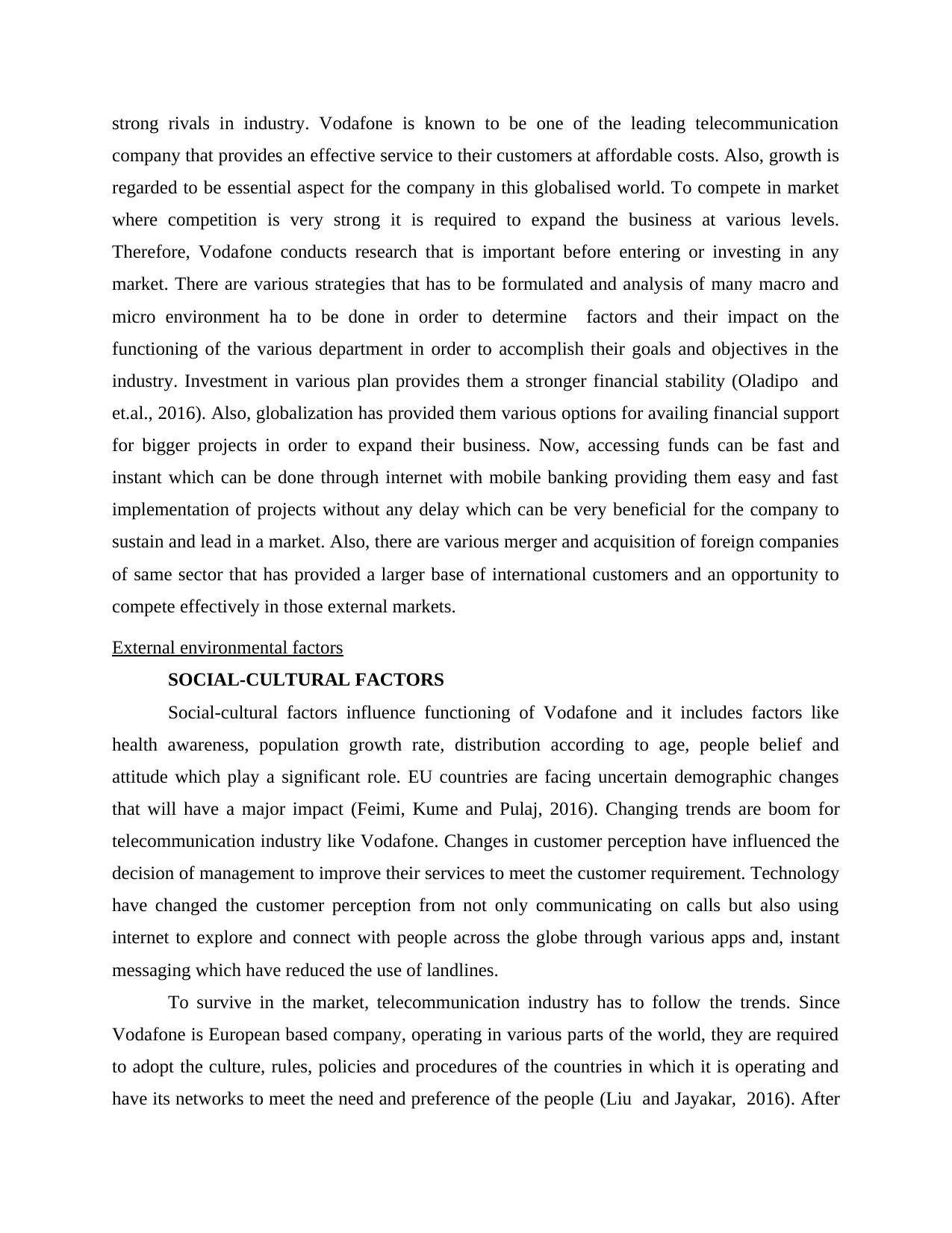
strong rivals in industry. Vodafone is known to be one of the leading telecommunication
company that provides an effective service to their customers at affordable costs. Also, growth is
regarded to be essential aspect for the company in this globalised world. To compete in market
where competition is very strong it is required to expand the business at various levels.
Therefore, Vodafone conducts research that is important before entering or investing in any
market. There are various strategies that has to be formulated and analysis of many macro and
micro environment ha to be done in order to determine factors and their impact on the
functioning of the various department in order to accomplish their goals and objectives in the
industry. Investment in various plan provides them a stronger financial stability (Oladipo and
et.al., 2016). Also, globalization has provided them various options for availing financial support
for bigger projects in order to expand their business. Now, accessing funds can be fast and
instant which can be done through internet with mobile banking providing them easy and fast
implementation of projects without any delay which can be very beneficial for the company to
sustain and lead in a market. Also, there are various merger and acquisition of foreign companies
of same sector that has provided a larger base of international customers and an opportunity to
compete effectively in those external markets.
External environmental factors
SOCIAL-CULTURAL FACTORS
Social-cultural factors influence functioning of Vodafone and it includes factors like
health awareness, population growth rate, distribution according to age, people belief and
attitude which play a significant role. EU countries are facing uncertain demographic changes
that will have a major impact (Feimi, Kume and Pulaj, 2016). Changing trends are boom for
telecommunication industry like Vodafone. Changes in customer perception have influenced the
decision of management to improve their services to meet the customer requirement. Technology
have changed the customer perception from not only communicating on calls but also using
internet to explore and connect with people across the globe through various apps and, instant
messaging which have reduced the use of landlines.
To survive in the market, telecommunication industry has to follow the trends. Since
Vodafone is European based company, operating in various parts of the world, they are required
to adopt the culture, rules, policies and procedures of the countries in which it is operating and
have its networks to meet the need and preference of the people (Liu and Jayakar, 2016). After
company that provides an effective service to their customers at affordable costs. Also, growth is
regarded to be essential aspect for the company in this globalised world. To compete in market
where competition is very strong it is required to expand the business at various levels.
Therefore, Vodafone conducts research that is important before entering or investing in any
market. There are various strategies that has to be formulated and analysis of many macro and
micro environment ha to be done in order to determine factors and their impact on the
functioning of the various department in order to accomplish their goals and objectives in the
industry. Investment in various plan provides them a stronger financial stability (Oladipo and
et.al., 2016). Also, globalization has provided them various options for availing financial support
for bigger projects in order to expand their business. Now, accessing funds can be fast and
instant which can be done through internet with mobile banking providing them easy and fast
implementation of projects without any delay which can be very beneficial for the company to
sustain and lead in a market. Also, there are various merger and acquisition of foreign companies
of same sector that has provided a larger base of international customers and an opportunity to
compete effectively in those external markets.
External environmental factors
SOCIAL-CULTURAL FACTORS
Social-cultural factors influence functioning of Vodafone and it includes factors like
health awareness, population growth rate, distribution according to age, people belief and
attitude which play a significant role. EU countries are facing uncertain demographic changes
that will have a major impact (Feimi, Kume and Pulaj, 2016). Changing trends are boom for
telecommunication industry like Vodafone. Changes in customer perception have influenced the
decision of management to improve their services to meet the customer requirement. Technology
have changed the customer perception from not only communicating on calls but also using
internet to explore and connect with people across the globe through various apps and, instant
messaging which have reduced the use of landlines.
To survive in the market, telecommunication industry has to follow the trends. Since
Vodafone is European based company, operating in various parts of the world, they are required
to adopt the culture, rules, policies and procedures of the countries in which it is operating and
have its networks to meet the need and preference of the people (Liu and Jayakar, 2016). After
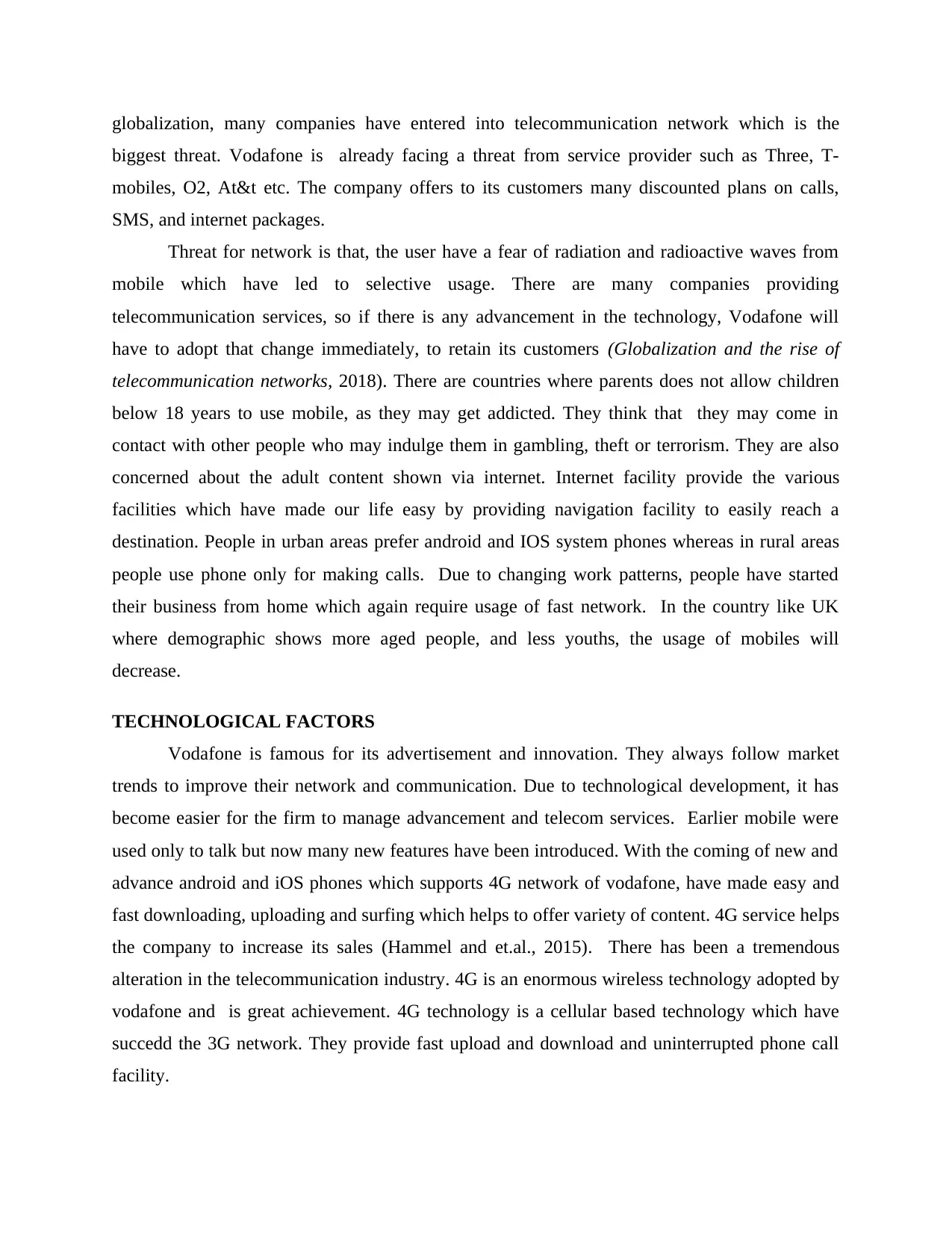
globalization, many companies have entered into telecommunication network which is the
biggest threat. Vodafone is already facing a threat from service provider such as Three, T-
mobiles, O2, At&t etc. The company offers to its customers many discounted plans on calls,
SMS, and internet packages.
Threat for network is that, the user have a fear of radiation and radioactive waves from
mobile which have led to selective usage. There are many companies providing
telecommunication services, so if there is any advancement in the technology, Vodafone will
have to adopt that change immediately, to retain its customers (Globalization and the rise of
telecommunication networks, 2018). There are countries where parents does not allow children
below 18 years to use mobile, as they may get addicted. They think that they may come in
contact with other people who may indulge them in gambling, theft or terrorism. They are also
concerned about the adult content shown via internet. Internet facility provide the various
facilities which have made our life easy by providing navigation facility to easily reach a
destination. People in urban areas prefer android and IOS system phones whereas in rural areas
people use phone only for making calls. Due to changing work patterns, people have started
their business from home which again require usage of fast network. In the country like UK
where demographic shows more aged people, and less youths, the usage of mobiles will
decrease.
TECHNOLOGICAL FACTORS
Vodafone is famous for its advertisement and innovation. They always follow market
trends to improve their network and communication. Due to technological development, it has
become easier for the firm to manage advancement and telecom services. Earlier mobile were
used only to talk but now many new features have been introduced. With the coming of new and
advance android and iOS phones which supports 4G network of vodafone, have made easy and
fast downloading, uploading and surfing which helps to offer variety of content. 4G service helps
the company to increase its sales (Hammel and et.al., 2015). There has been a tremendous
alteration in the telecommunication industry. 4G is an enormous wireless technology adopted by
vodafone and is great achievement. 4G technology is a cellular based technology which have
succedd the 3G network. They provide fast upload and download and uninterrupted phone call
facility.
biggest threat. Vodafone is already facing a threat from service provider such as Three, T-
mobiles, O2, At&t etc. The company offers to its customers many discounted plans on calls,
SMS, and internet packages.
Threat for network is that, the user have a fear of radiation and radioactive waves from
mobile which have led to selective usage. There are many companies providing
telecommunication services, so if there is any advancement in the technology, Vodafone will
have to adopt that change immediately, to retain its customers (Globalization and the rise of
telecommunication networks, 2018). There are countries where parents does not allow children
below 18 years to use mobile, as they may get addicted. They think that they may come in
contact with other people who may indulge them in gambling, theft or terrorism. They are also
concerned about the adult content shown via internet. Internet facility provide the various
facilities which have made our life easy by providing navigation facility to easily reach a
destination. People in urban areas prefer android and IOS system phones whereas in rural areas
people use phone only for making calls. Due to changing work patterns, people have started
their business from home which again require usage of fast network. In the country like UK
where demographic shows more aged people, and less youths, the usage of mobiles will
decrease.
TECHNOLOGICAL FACTORS
Vodafone is famous for its advertisement and innovation. They always follow market
trends to improve their network and communication. Due to technological development, it has
become easier for the firm to manage advancement and telecom services. Earlier mobile were
used only to talk but now many new features have been introduced. With the coming of new and
advance android and iOS phones which supports 4G network of vodafone, have made easy and
fast downloading, uploading and surfing which helps to offer variety of content. 4G service helps
the company to increase its sales (Hammel and et.al., 2015). There has been a tremendous
alteration in the telecommunication industry. 4G is an enormous wireless technology adopted by
vodafone and is great achievement. 4G technology is a cellular based technology which have
succedd the 3G network. They provide fast upload and download and uninterrupted phone call
facility.
⊘ This is a preview!⊘
Do you want full access?
Subscribe today to unlock all pages.

Trusted by 1+ million students worldwide
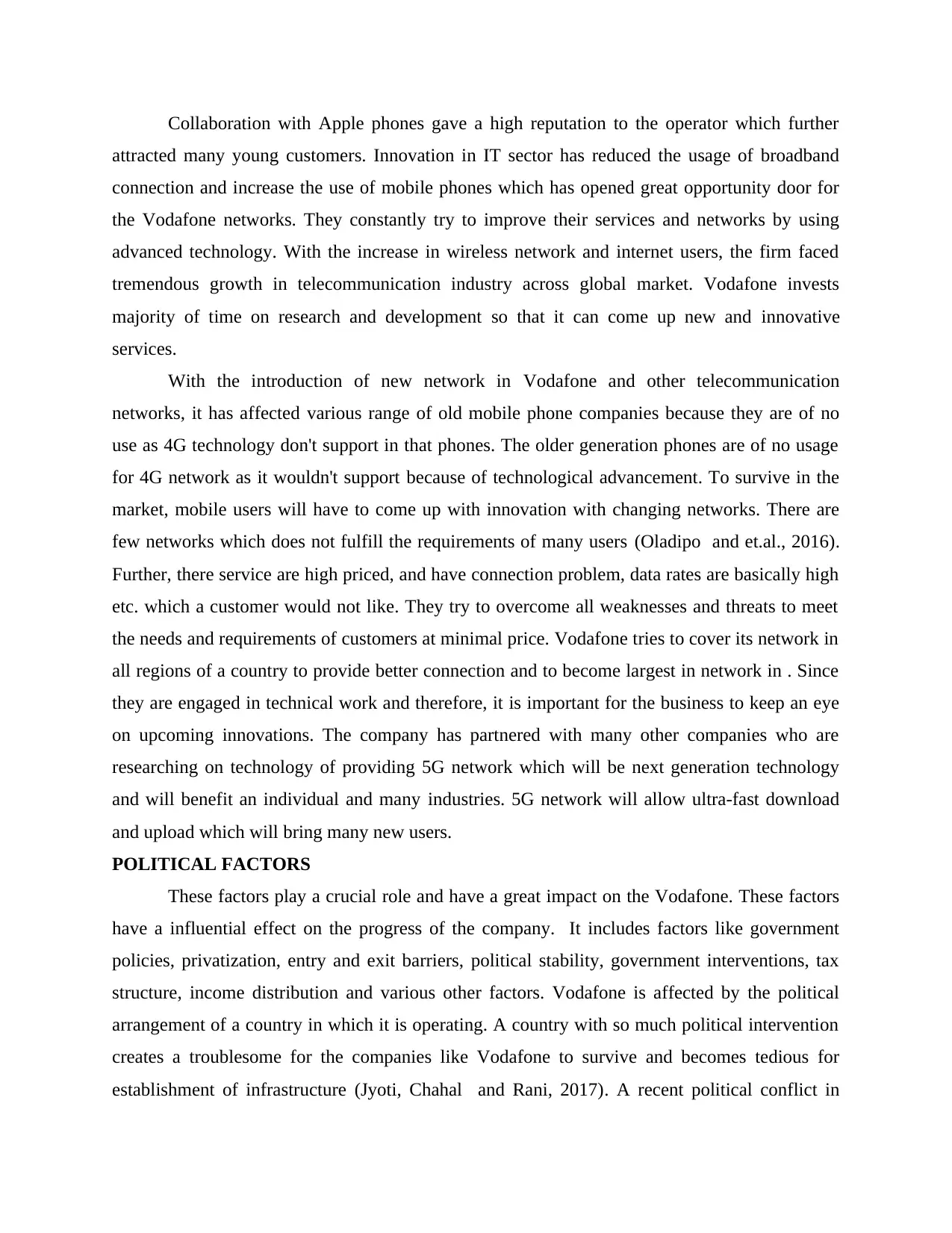
Collaboration with Apple phones gave a high reputation to the operator which further
attracted many young customers. Innovation in IT sector has reduced the usage of broadband
connection and increase the use of mobile phones which has opened great opportunity door for
the Vodafone networks. They constantly try to improve their services and networks by using
advanced technology. With the increase in wireless network and internet users, the firm faced
tremendous growth in telecommunication industry across global market. Vodafone invests
majority of time on research and development so that it can come up new and innovative
services.
With the introduction of new network in Vodafone and other telecommunication
networks, it has affected various range of old mobile phone companies because they are of no
use as 4G technology don't support in that phones. The older generation phones are of no usage
for 4G network as it wouldn't support because of technological advancement. To survive in the
market, mobile users will have to come up with innovation with changing networks. There are
few networks which does not fulfill the requirements of many users (Oladipo and et.al., 2016).
Further, there service are high priced, and have connection problem, data rates are basically high
etc. which a customer would not like. They try to overcome all weaknesses and threats to meet
the needs and requirements of customers at minimal price. Vodafone tries to cover its network in
all regions of a country to provide better connection and to become largest in network in . Since
they are engaged in technical work and therefore, it is important for the business to keep an eye
on upcoming innovations. The company has partnered with many other companies who are
researching on technology of providing 5G network which will be next generation technology
and will benefit an individual and many industries. 5G network will allow ultra-fast download
and upload which will bring many new users.
POLITICAL FACTORS
These factors play a crucial role and have a great impact on the Vodafone. These factors
have a influential effect on the progress of the company. It includes factors like government
policies, privatization, entry and exit barriers, political stability, government interventions, tax
structure, income distribution and various other factors. Vodafone is affected by the political
arrangement of a country in which it is operating. A country with so much political intervention
creates a troublesome for the companies like Vodafone to survive and becomes tedious for
establishment of infrastructure (Jyoti, Chahal and Rani, 2017). A recent political conflict in
attracted many young customers. Innovation in IT sector has reduced the usage of broadband
connection and increase the use of mobile phones which has opened great opportunity door for
the Vodafone networks. They constantly try to improve their services and networks by using
advanced technology. With the increase in wireless network and internet users, the firm faced
tremendous growth in telecommunication industry across global market. Vodafone invests
majority of time on research and development so that it can come up new and innovative
services.
With the introduction of new network in Vodafone and other telecommunication
networks, it has affected various range of old mobile phone companies because they are of no
use as 4G technology don't support in that phones. The older generation phones are of no usage
for 4G network as it wouldn't support because of technological advancement. To survive in the
market, mobile users will have to come up with innovation with changing networks. There are
few networks which does not fulfill the requirements of many users (Oladipo and et.al., 2016).
Further, there service are high priced, and have connection problem, data rates are basically high
etc. which a customer would not like. They try to overcome all weaknesses and threats to meet
the needs and requirements of customers at minimal price. Vodafone tries to cover its network in
all regions of a country to provide better connection and to become largest in network in . Since
they are engaged in technical work and therefore, it is important for the business to keep an eye
on upcoming innovations. The company has partnered with many other companies who are
researching on technology of providing 5G network which will be next generation technology
and will benefit an individual and many industries. 5G network will allow ultra-fast download
and upload which will bring many new users.
POLITICAL FACTORS
These factors play a crucial role and have a great impact on the Vodafone. These factors
have a influential effect on the progress of the company. It includes factors like government
policies, privatization, entry and exit barriers, political stability, government interventions, tax
structure, income distribution and various other factors. Vodafone is affected by the political
arrangement of a country in which it is operating. A country with so much political intervention
creates a troublesome for the companies like Vodafone to survive and becomes tedious for
establishment of infrastructure (Jyoti, Chahal and Rani, 2017). A recent political conflict in
Paraphrase This Document
Need a fresh take? Get an instant paraphrase of this document with our AI Paraphraser
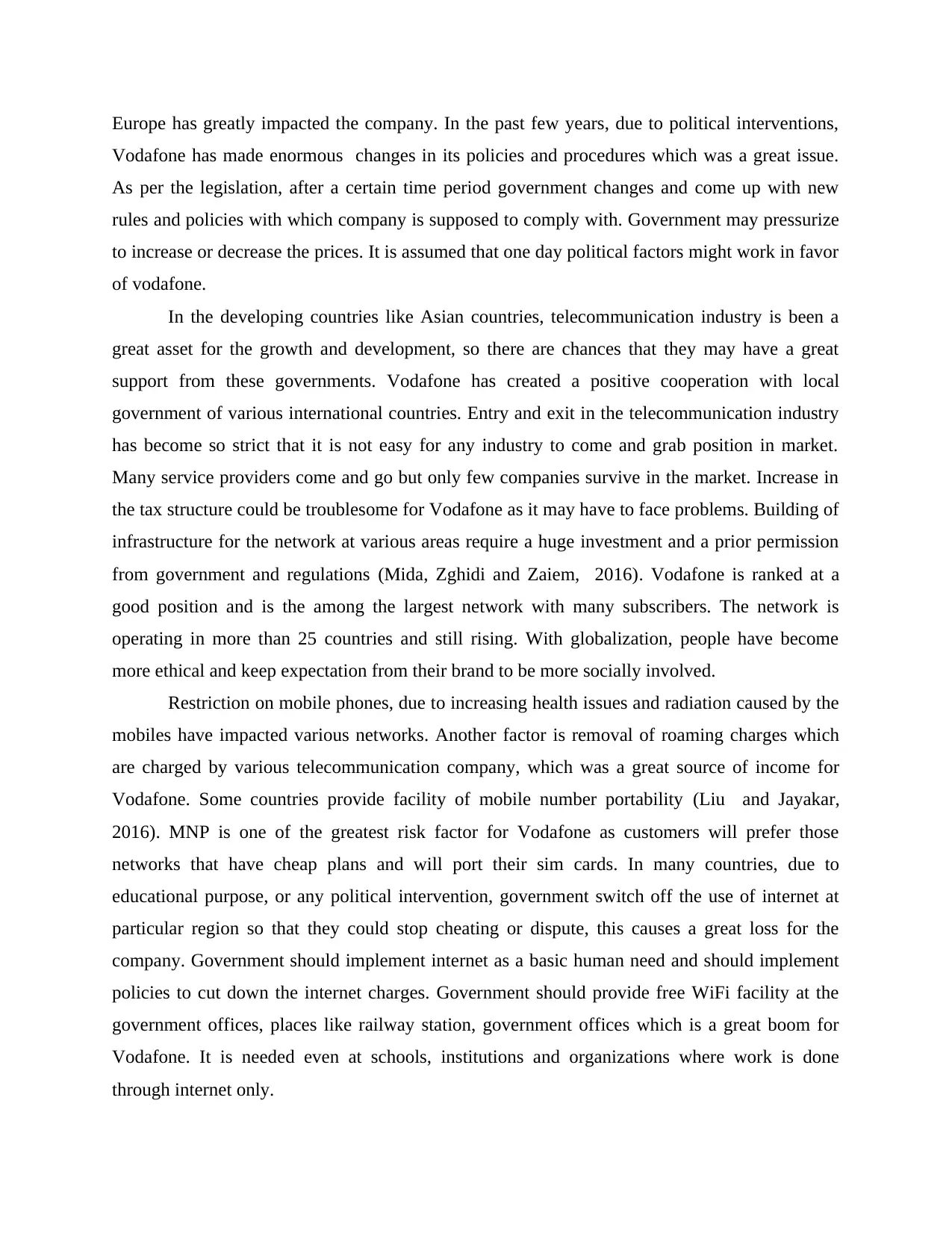
Europe has greatly impacted the company. In the past few years, due to political interventions,
Vodafone has made enormous changes in its policies and procedures which was a great issue.
As per the legislation, after a certain time period government changes and come up with new
rules and policies with which company is supposed to comply with. Government may pressurize
to increase or decrease the prices. It is assumed that one day political factors might work in favor
of vodafone.
In the developing countries like Asian countries, telecommunication industry is been a
great asset for the growth and development, so there are chances that they may have a great
support from these governments. Vodafone has created a positive cooperation with local
government of various international countries. Entry and exit in the telecommunication industry
has become so strict that it is not easy for any industry to come and grab position in market.
Many service providers come and go but only few companies survive in the market. Increase in
the tax structure could be troublesome for Vodafone as it may have to face problems. Building of
infrastructure for the network at various areas require a huge investment and a prior permission
from government and regulations (Mida, Zghidi and Zaiem, 2016). Vodafone is ranked at a
good position and is the among the largest network with many subscribers. The network is
operating in more than 25 countries and still rising. With globalization, people have become
more ethical and keep expectation from their brand to be more socially involved.
Restriction on mobile phones, due to increasing health issues and radiation caused by the
mobiles have impacted various networks. Another factor is removal of roaming charges which
are charged by various telecommunication company, which was a great source of income for
Vodafone. Some countries provide facility of mobile number portability (Liu and Jayakar,
2016). MNP is one of the greatest risk factor for Vodafone as customers will prefer those
networks that have cheap plans and will port their sim cards. In many countries, due to
educational purpose, or any political intervention, government switch off the use of internet at
particular region so that they could stop cheating or dispute, this causes a great loss for the
company. Government should implement internet as a basic human need and should implement
policies to cut down the internet charges. Government should provide free WiFi facility at the
government offices, places like railway station, government offices which is a great boom for
Vodafone. It is needed even at schools, institutions and organizations where work is done
through internet only.
Vodafone has made enormous changes in its policies and procedures which was a great issue.
As per the legislation, after a certain time period government changes and come up with new
rules and policies with which company is supposed to comply with. Government may pressurize
to increase or decrease the prices. It is assumed that one day political factors might work in favor
of vodafone.
In the developing countries like Asian countries, telecommunication industry is been a
great asset for the growth and development, so there are chances that they may have a great
support from these governments. Vodafone has created a positive cooperation with local
government of various international countries. Entry and exit in the telecommunication industry
has become so strict that it is not easy for any industry to come and grab position in market.
Many service providers come and go but only few companies survive in the market. Increase in
the tax structure could be troublesome for Vodafone as it may have to face problems. Building of
infrastructure for the network at various areas require a huge investment and a prior permission
from government and regulations (Mida, Zghidi and Zaiem, 2016). Vodafone is ranked at a
good position and is the among the largest network with many subscribers. The network is
operating in more than 25 countries and still rising. With globalization, people have become
more ethical and keep expectation from their brand to be more socially involved.
Restriction on mobile phones, due to increasing health issues and radiation caused by the
mobiles have impacted various networks. Another factor is removal of roaming charges which
are charged by various telecommunication company, which was a great source of income for
Vodafone. Some countries provide facility of mobile number portability (Liu and Jayakar,
2016). MNP is one of the greatest risk factor for Vodafone as customers will prefer those
networks that have cheap plans and will port their sim cards. In many countries, due to
educational purpose, or any political intervention, government switch off the use of internet at
particular region so that they could stop cheating or dispute, this causes a great loss for the
company. Government should implement internet as a basic human need and should implement
policies to cut down the internet charges. Government should provide free WiFi facility at the
government offices, places like railway station, government offices which is a great boom for
Vodafone. It is needed even at schools, institutions and organizations where work is done
through internet only.

⊘ This is a preview!⊘
Do you want full access?
Subscribe today to unlock all pages.

Trusted by 1+ million students worldwide
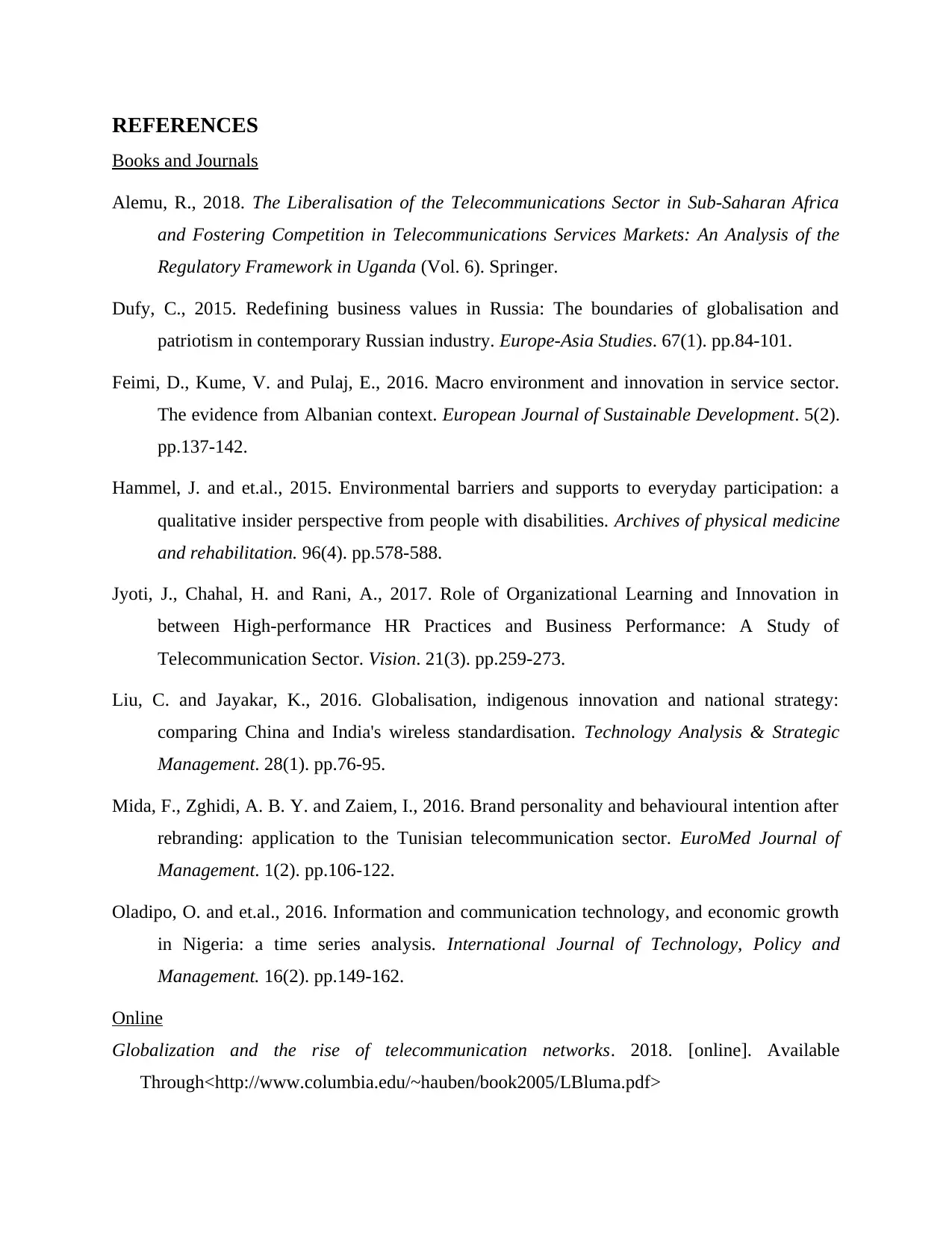
REFERENCES
Books and Journals
Alemu, R., 2018. The Liberalisation of the Telecommunications Sector in Sub-Saharan Africa
and Fostering Competition in Telecommunications Services Markets: An Analysis of the
Regulatory Framework in Uganda (Vol. 6). Springer.
Dufy, C., 2015. Redefining business values in Russia: The boundaries of globalisation and
patriotism in contemporary Russian industry. Europe-Asia Studies. 67(1). pp.84-101.
Feimi, D., Kume, V. and Pulaj, E., 2016. Macro environment and innovation in service sector.
The evidence from Albanian context. European Journal of Sustainable Development. 5(2).
pp.137-142.
Hammel, J. and et.al., 2015. Environmental barriers and supports to everyday participation: a
qualitative insider perspective from people with disabilities. Archives of physical medicine
and rehabilitation. 96(4). pp.578-588.
Jyoti, J., Chahal, H. and Rani, A., 2017. Role of Organizational Learning and Innovation in
between High-performance HR Practices and Business Performance: A Study of
Telecommunication Sector. Vision. 21(3). pp.259-273.
Liu, C. and Jayakar, K., 2016. Globalisation, indigenous innovation and national strategy:
comparing China and India's wireless standardisation. Technology Analysis & Strategic
Management. 28(1). pp.76-95.
Mida, F., Zghidi, A. B. Y. and Zaiem, I., 2016. Brand personality and behavioural intention after
rebranding: application to the Tunisian telecommunication sector. EuroMed Journal of
Management. 1(2). pp.106-122.
Oladipo, O. and et.al., 2016. Information and communication technology, and economic growth
in Nigeria: a time series analysis. International Journal of Technology, Policy and
Management. 16(2). pp.149-162.
Online
Globalization and the rise of telecommunication networks. 2018. [online]. Available
Through<http://www.columbia.edu/~hauben/book2005/LBluma.pdf>
Books and Journals
Alemu, R., 2018. The Liberalisation of the Telecommunications Sector in Sub-Saharan Africa
and Fostering Competition in Telecommunications Services Markets: An Analysis of the
Regulatory Framework in Uganda (Vol. 6). Springer.
Dufy, C., 2015. Redefining business values in Russia: The boundaries of globalisation and
patriotism in contemporary Russian industry. Europe-Asia Studies. 67(1). pp.84-101.
Feimi, D., Kume, V. and Pulaj, E., 2016. Macro environment and innovation in service sector.
The evidence from Albanian context. European Journal of Sustainable Development. 5(2).
pp.137-142.
Hammel, J. and et.al., 2015. Environmental barriers and supports to everyday participation: a
qualitative insider perspective from people with disabilities. Archives of physical medicine
and rehabilitation. 96(4). pp.578-588.
Jyoti, J., Chahal, H. and Rani, A., 2017. Role of Organizational Learning and Innovation in
between High-performance HR Practices and Business Performance: A Study of
Telecommunication Sector. Vision. 21(3). pp.259-273.
Liu, C. and Jayakar, K., 2016. Globalisation, indigenous innovation and national strategy:
comparing China and India's wireless standardisation. Technology Analysis & Strategic
Management. 28(1). pp.76-95.
Mida, F., Zghidi, A. B. Y. and Zaiem, I., 2016. Brand personality and behavioural intention after
rebranding: application to the Tunisian telecommunication sector. EuroMed Journal of
Management. 1(2). pp.106-122.
Oladipo, O. and et.al., 2016. Information and communication technology, and economic growth
in Nigeria: a time series analysis. International Journal of Technology, Policy and
Management. 16(2). pp.149-162.
Online
Globalization and the rise of telecommunication networks. 2018. [online]. Available
Through<http://www.columbia.edu/~hauben/book2005/LBluma.pdf>
Paraphrase This Document
Need a fresh take? Get an instant paraphrase of this document with our AI Paraphraser

1 out of 11
Related Documents
Your All-in-One AI-Powered Toolkit for Academic Success.
+13062052269
info@desklib.com
Available 24*7 on WhatsApp / Email
![[object Object]](/_next/static/media/star-bottom.7253800d.svg)
Unlock your academic potential
Copyright © 2020–2026 A2Z Services. All Rights Reserved. Developed and managed by ZUCOL.




